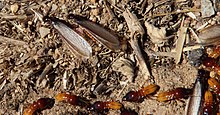Microhodotermes is a genus of southern African harvester termites in the Hodotermitidae. As with harvester termites in general, they have serrated inner edges to their mandibles, and all castes have functional compound eyes.[1] Species of this genus are desert specialists of the Namib, Kalahari and Karoo, where their ranges overlap with Hodotermes.[2][3]
| Microhodotermes | |
|---|---|

| |
| Microhodotermes viator | |
| Scientific classification | |
| Domain: | Eukaryota |
| Kingdom: | Animalia |
| Phylum: | Arthropoda |
| Class: | Insecta |
| Order: | Blattodea |
| Infraorder: | Isoptera |
| Family: | Hodotermitidae |
| Genus: | Microhodotermes Sjöstedt, 1926 |
They forage at night and during daylight hours, and their pigmented workers[3] are often observed outside the nest.[1] The workers of M. viator collect mostly woody material, with Pteronia and vygie species being favoured.[3]
Colonies of M. viator produce initially small,[4] conical mounds on soil with sufficient clay content.[3] These are speculated to cause the formation of increasingly large heuweltjies.[4] Widespread foraging and burrowing activity of aardvarks are associated with heuweltjies inhabited by M. viator.[4]
Species
editThe genus contains three species:[5]
- Microhodotermes maroccanus (Sjöstedt, 1926)
- Microhodotermes viator (Latreille, 1804)
- Microhodotermes wasmanni (Sjöstedt, 1900)
References
edit- ^ a b Scholtz, Clarke H.; et al. (1985). Insects of Southern Africa. Durban: Butterworths. p. 57. ISBN 0409-10487-6.
- ^ Abe, Takuya; et al. (2000–2002). Termites: Evolution, Sociality, Symbioses, Ecology. Dordrecht, The Netherlands: Kluwer Academic Publishers. pp. 35–36. ISBN 0-7923-6361-2.
- ^ a b c d Picker, Mike; et al. (2004). Field Guide to Insects of South Africa. Cape Town: Struik Publishers. p. 176. ISBN 978-1-77007-061-5.
- ^ a b c Moore, J. M.; Picker, M. D. (1991). "Heuweltjies (earth mounds) in the Clanwilliam district, Cape Province, South Africa: 4000-year-old termite nests". Oecologia. 86 (3): 424–432. Bibcode:1991Oecol..86..424M. doi:10.1007/bf00317612. PMID 28312932.
- ^ "Microhodotermes Sjöstedt, 1926". Isoptera. biolib.cz. Retrieved 5 February 2013.